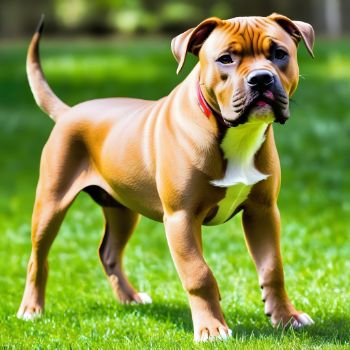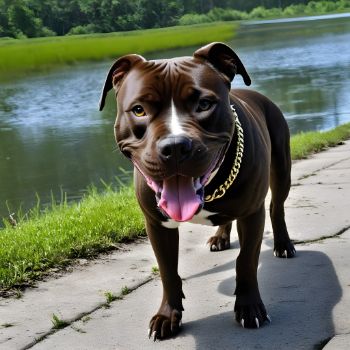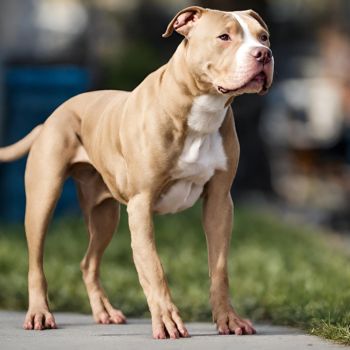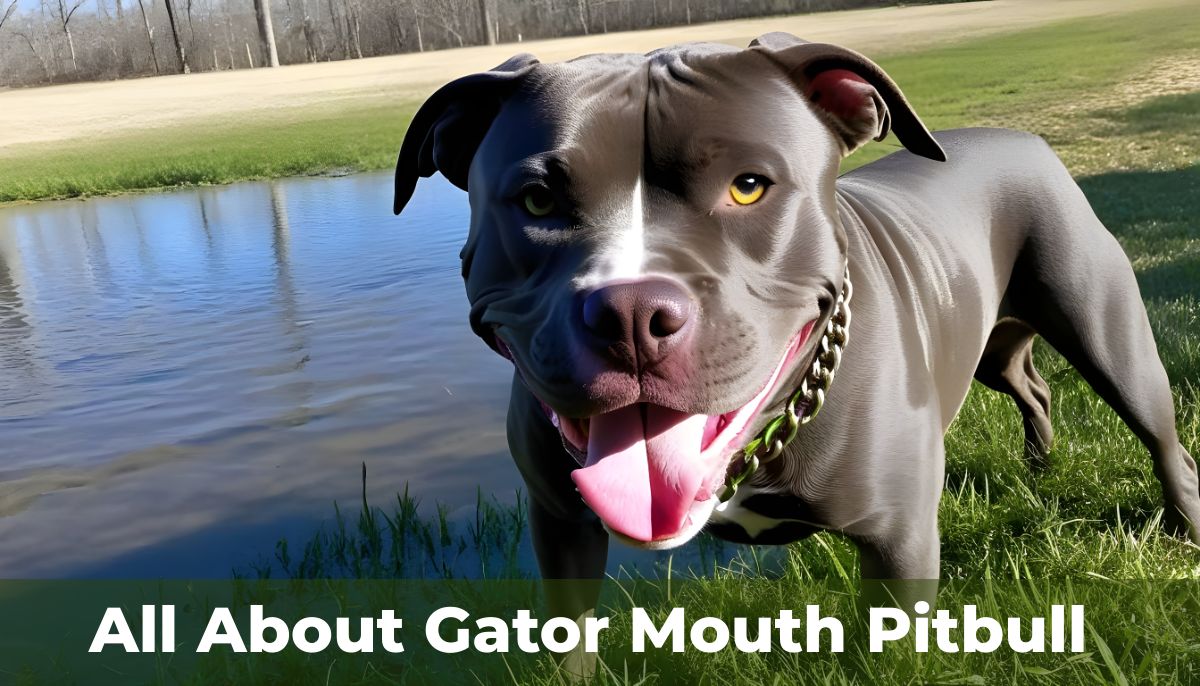Today, I want to talk about one of my favorite dog breeds – the Gator Mouth Pitbull. Now, I know what you’re thinking – “Gator Mouth? That sounds terrifying!” But let me tell you, these dogs are anything but scary. In fact, they’re some of the most loyal and loving pets you could ever ask for.
So, what exactly is a Gator Pit? Well, as the name suggests, these dogs have a powerful jaw – one that’s capable of crushing through even the toughest of bones. But don’t let that intimidate you – these dogs are gentle giants.
They’re known for their friendly personalities and unwavering loyalty to their owners. In fact, many people consider them to be some of the best family dogs around.
In this article, we’ll talk about what makes Gator Mouth Pits unique. Understanding them is essential for being a good pet owner and having a happy connection with these incredible dogs. So, let’s jump in and find out more about these dogs!
What is a gator-mouth pitbull?
The Gator Mouth Pitbull, also referred to as “alligator Pitbull” or “Gatorhead Pitbull,” is a medium to large-sized dog breed known for its distinctive “gator mouth” jaw structure, strength, loyalty, and intelligence.
The term “Gator Mouth” in their name is a nod to their distinct jaw structure, resembling an alligator’s robust and tenacious bite. It signifies the unique physical trait that sets them apart in the vast landscape of dog breeds.
Did you know?
The term ‘Gator Mouth’ isn’t just about jaws; it’s a symbol of the breed’s tenacity and resilience.
It is a product of strategic breeding that involves the fusion of various terrier breeds, the American Pit Bull Terrier, American Staffordshire Terrier, and possibly other terrier strains.
These dogs exhibit a range of coat lengths and a muscular build. Their unique jaw structure contributes to their strength, and their history involves a blend of terrier breeds for various tasks.
History and origin:
Originating from the United States, these dogs have a lineage deeply embedded in the early 19th century, where they were selectively bred for utilitarian purposes.

The breed’s history intertwines with tasks such as hunting, herding, and guarding, reflecting their versatility and adaptability. Its ancestry involves carefully curating traits to enhance their physical prowess and intelligence.
Breeders, recognizing the need for agile and tenacious dogs, meticulously selected individuals with the desired qualities, fostering the development of a breed known for its strong work ethic and unwavering loyalty.
Transitioning to the modern era, the Gator Mouth American Pit Bull Terrier has encountered various challenges, including misconceptions about aggression.
When responsibly raised and trained, these dogs exhibit remarkable temperament and make exceptional family pets.
It’s imperative to understand that their behavior is a product of upbringing and environment, dispelling the notion of inherent aggression.
Genetics:
Understanding the genetics of the Gator Pitbull breed is crucial for potential owners and enthusiasts alike.
The presence of the brindle gene determines the distinctive striped pattern seen in some gator bully pitbulls.
D-locus (Dilution):
Affects the intensity of coat color; variations in the dilution gene can result in lighter or darker coat shades.
E-locus (Extension):
Determines the distribution of black pigment (eumelanin) and red/yellow pigment (pheomelanin)
MMP-9 Gene (Matrix Metalloproteinase 9):
Regulates jaw development. Variations in this gene contribute to the distinctive “gator mouth” jaw structure, known for its strength and tenacity.
Appearance:
Here are the characteristics of these dogs and how they appear.
Muscular Build:
Well-defined musculature contributes to a robust and powerful appearance.
Size and Proportion:
Medium to large-sized dogs with a balanced and proportional body structure.
Height typically ranges from 17 to 21 inches at the shoulder.
Ears and Eyes:
Ears can be cropped or left natural, standing erect when cropped.
Round to oval-shaped eyes, conveying alertness and intelligence.
Coat and Color:
Coat length varies from short and smooth to medium.
Diverse coat colors include brindle, fawn, black, and red.
Glossy sheen on the coat, enhancing their overall appearance.
Neck and Chest:
Robust and muscular neck leading to a broad chest.
Chest deep and well-sprung, emphasizing physical prowess.
Tail:
Tail is set low, tapering to a point.
Carried low, adding to the breed’s distinctive silhouette.
Legs and Feet:
Straight, well-muscled legs with solid bone structure.
Compact, round feet with well-arched toes.
Movement and Gait:
Agile and energetic movement, reflecting their terrier lineage.
Smooth, purposeful gait showcasing their physical capabilities.
Expression and Temperament:
Alert and intelligent expression in the eyes.
Overall appearance exudes confidence and loyalty.
Physical Characteristics:
It becomes evident that their head structure, jaw strength, size, and weight collectively contribute to a breed known for its strength, tenacity, and distinctive appearance.
Head Structure:
It consists of:
Broad Cranial Form:
The Alligator Pit Dog exhibits a distinctive head structure characterized by a broad cranial form.
This broadness contributes to a well-defined and imposing appearance.
Pronounced Stop:
The head features a pronounced stop, adding to the breed’s unique facial profile.
This stop enhances the dog’s alert and attentive expression.
Jaw Strength:
Its jaws and bite are very strong.
“Alligator” Jaw Structure:
Aptly named, the breed possesses an “alligator” jaw structure, showcasing considerable strength.
This robust jaw design serves both functional and historical purposes.
Tenacious Bite Force:
The jaw strength of this dog is notable for its tenacious bite force.
This characteristic results from selective breeding for tasks that require a powerful and effective bite.
American Gator Pitbull Lifespan:
The American Gator Pitbull, owing to its breed characteristics and genetic factors, generally has a lifespan ranging from 10 to 15 years.
This duration can vary depending on individual health, environmental conditions, and responsible care practices.
- Genetic factors shape lifespan in American Gator pit bulls.
- Regular veterinary check-ups aid in early health issue detection.
- A balanced diet is crucial for overall health and longevity.
- Regular exercise supports the dog’s well-being and extends its lifespan.
- A nurturing living environment positively influences lifespan.
Energy levels:
The energy levels of the Gator Head Pit vary based on tasks, reflecting their versatility.
I’ve observed that these dogs possess high energy levels suitable for different activities. They exhibit a lively and playful demeanor when engaged in play, showcasing their agility and enthusiasm.
During exercise, such as walks or runs, their energetic disposition becomes evident, requiring regular physical activity to maintain their well-being.
However, in my observations, they also display a calm and attentive demeanor when adequately trained, adapting well to relaxed environments.
Gator Mouth Pitbull Teeth:
It possesses a distinctive set of teeth integral to its overall well-being. With a strong jaw structure, these dogs exhibit a robust bite force, reflecting their historical roles.
The teeth are generally solid and well-aligned, contributing to their effectiveness in tasks such as hunting and guarding.
Gator Pitbulls colors:
These dogs exist in various coat colors that are mentioned below:
Brindle Gator Mouth Pitbull:
The brindle coat showcases a unique striped pattern, with varying shades blending seamlessly, contributing to the breed’s individuality.
Aesthetic Appeal:
Beyond its functional history, the brindle variation adds an appealing visual dimension to this dog, making it stand out among other coat colors.
Red Nose Gator Pitbull:
The red nose of this variation provides a distinctive contrast to the coat, drawing attention to the breed’s facial characteristics.
Visual Individuality:
Red nose Pits, with their copper-colored noses, possess a visual distinctiveness that sets them apart within the breed.
Gator Blue Pitbulls:
Blue-coated Gators exhibit a sleek and glossy appearance, enhancing the breed’s aesthetic appeal.
Versatile Color Palette:
The blue coat variation contributes to the breed’s visual diversity, offering a unique and captivating color option.
Blue Nose Gator Pitbull:
Featuring a blue-colored nose, this variation adds a unique touch to the blue gator pit’s facial characteristics, contributing to its visual appeal.
Color-Coordinated Features:
The blue nose complements the coat color, creating a harmonious and visually appealing appearance within the breed.
White Gator Pitbull:
The white coat variation stands out with its crisp and clean appearance, providing a less common but visually striking option.
Distinctive Presence:
White Gators exhibit a unique presence, showcasing a coat color contrasting with the breed’s more traditional hues.
Black Gator Mouth Pitbull:
Black-coated Gator pitt exhibits an elegant and powerful aesthetic, emphasizing the breed’s robust physique.
Understated Elegance:
The black coat adds an understated elegance to the breed, offering a color option that exudes strength and vitality.
Breed Standards:
The term “Gator-mouth Pitbull” lacks official recognition as a distinct breed or variety within the American Pitbull Terrier.
Without established breed standards from recognized kennel clubs like the AKC or UKC, it remains a descriptive term used for pitbulls with a broader muzzle and wider jaw.
It’s crucial to note that individual variations, like jaw structure, may exist within the broader American Pitbull Terrier breed without signifying a separate breed.
Responsible breeding emphasizes overall health, temperament, and suitability for family life rather than isolated physical traits.
Temperament and Behavior:
The gator Head Pitbull is known for its loyalty and intelligence, often forming strong bonds with its family members.

Their protective nature makes them excellent watchdogs, alert to environmental changes.
Despite their muscular appearance, many display a gentle and affectionate side, fostering positive interactions within the family.
Socialization Needs:
Adequate socialization is crucial from an early age to ensure a well-adjusted and friendly adult dog.
Exposure to various people, environments, and other animals helps prevent potential behavioral issues.
In my experience, proper socialization contributes to a confident and adaptable Alligator Head Pitbull.
Training Considerations:
Keep in mind the following methods to train your dog.
Positive Reinforcement Techniques:
In my experience with Alligator Head Pitbulls, establishing a solid bond and clear communication is fundamental to their training.
Positive reinforcement techniques, utilizing treats and enthusiastic praise to reward desired behaviors, have proven highly effective. Consistency is paramount.
Enforcing rules consistently helps them understand expectations.
Early Introduction of Basic Commands:
Starting training early in their development ensures a smoother learning curve. Introducing basic commands like sit, stay, and recall from a young age lays a solid foundation.
I’ve noticed that incorporating short, engaging training sessions into daily routines helps keep them mentally stimulated.
Understanding Individual Preferences:
Understanding their individual preferences and motivators is critical. For some, playtime may be a potent reward, while others may respond more to treats.
Patience is essential; these dogs are eager to please, but each may have its unique learning pace.
Positive Reinforcement Over Punishment:
My training approach focuses on positive reinforcement for good behavior rather than punishment for mistakes. It not only builds trust but also cultivates a positive association with learning.
I’ve seen that these intelligent dogs respond well to a nurturing and encouraging environment.
Consistent Socialization Practices:
Consistent socialization is an extension of their training. Exposing them to various environments, people, and other animals helps shape a well-rounded and adaptable companion.
Regular positive interactions contribute to their friendly disposition.
Are Gator Pits More Aggressive?

No, Gator Pits are not inherently more aggressive. In my experience with these dogs, their behavior is largely influenced by training, socialization, and individual temperament.
Like any breed, they can be affectionate and loyal when provided with proper care and responsible ownership.
It’s crucial to dispel the notion that aggression is predetermined by breed.
Instead, it stems from external factors such as inadequate training, lack of socialization, or mistreatment.
Responsible ownership practices, including positive reinforcement training and early exposure to various environments, play a vital role in shaping the temperament of Gator Pits.
Gator Mouth Pitbull Bloodline:
It refers to a specific lineage within the broader American Pitbull Terrier breed. Distinctive physical traits and temperamental attributes characterize this bloodline passed down through generations.
Notable Bloodlines:
Some of alligator pitbull bloodlines include:
- Gotti Gator Pitbull:
- Gator Mouth Razor Edge Pitbull
- Colby Pitbulls
- Jeep Pitbulls
- Chinaman Pitbulls
- Eli Pitbulls
- Mayday Pitbulls
Gator mouth pits Care and Maintenance:
Having trained and cared for numerous Pitbulls, including Gator Mouth Pits, within a professional training center, I’ve gathered valuable insights into their optimal care and well-being.
Diet and Nutrition
- Gator pitt benefits from a diet rich in high-quality protein sources like lean meats, poultry, and fish.
- My experience working with these dogs has shown that a well-rounded diet contributes significantly to their health and vitality. Incorporating high-quality protein sources and essential nutrients is vital for their overall well-being.
Exercise Requirements
Establish a consistent exercise routine for these dogs.
Hiking or Trail Walks:
Take them on hiking trails or nature walks to introduce variety to their exercise routine.
Interactive Play:
Engage them in interactive play sessions with toys like fetch or tug-of-war.
Running and Sprinting:
- Gator Pitbulls, being an athletic breed, enjoy running and sprinting activities.
- Find secure spaces like fenced yards or dog parks for off-leash running, allowing them to unleash their energy.
My efforts in engaging these dogs in structured activities have kept them physically fit and stimulated their minds, preventing boredom.
Incorporating various activities like agility exercises and puzzle toys has proven beneficial in maintaining their overall health.
Grooming Tips:
Following these specific grooming tips ensures that these dogs look their best.
Brushing:
Brush short coat weekly to minimize shedding and maintain skin health.
Opt for a bristle brush suitable for short coats to stimulate the skin.
Bristle brushes enhance coat health and provide a soothing grooming experience.
Tail and Anal Gland Care:
Clean around the tail and address anal glands during grooming.
Regular attention prevents discomfort and potential infections.
Dental Care:
Brush teeth regularly and use dental chews for oral health.
Health Concerns:
Here are some common health concerns found in this breed.
Hip Dysplasia:
Genetic hip joint malformation causing arthritis. Managed through weight control and mutual support for improved mobility.
Skin Allergies:
Dog skin reactions marked by itching and redness due to allergens. Prevented by identifying triggers and maintaining a clean environment.
Obesity:
Imbalance in calorie intake leading to health issues. Prevented through portion control, a balanced diet, and regular exercise.
Preventive Measures:
You should take following preventive measures.
Regular Exercise:
Daily walks and engaging activities are essential preventive measures, contributing not only to weight management but also to the overall well-being of these dogs.
Balanced Diet:
A carefully balanced diet, supplemented with joint-supportive nutrients, is vital to preventing health issues and ensuring optimal growth and vitality.
Allergen Management:
Identifying and minimizing exposure to allergens is crucial in preventing skin issues, making proactive management an integral part of their care.
Veterinary Care:
Take your dog for vet care and keep in mind the following.
Routine Check-ups:
Regular vet visits for check-ups, vaccinations, and preventive care are crucial in maintaining overall health and catching potential issues early.
Dental Check-ups:
Regular dental check-ups and at-home care like brushing contribute to maintaining good oral health and preventing dental problems.
Early Intervention:
Early intervention at the first sign of health concerns and professional advice are vital in ensuring prompt and effective care for Gator Mouth Pits.
Gator Mouth Pitbull Facts:
- Many Gator gator-mouth pitbulls possess a natural affinity for swimming.
- They express themselves through barks, grumbles, and distinctive howls.
- They do not get tired quickly during extended outdoor activities.
- They showcase problem-solving skills.
- These dogs are generally hardy and resilient.
Gator mouth pitbull Puppies:
Gator Pit puppies refer to the young offspring of the breed, characterized by their distinctive physical traits such as a robust build and a powerful jaw.
Known for their loyalty and distinctive appearance, these puppies make excellent companions when raised in a loving and responsible environment.
Reputable breeders play a crucial role in maintaining the breed’s health and temperament. Prospective owners should consider pricing variations influenced by pedigree and breeder reputation.
Proper care, early socialization, and adherence to local regulations are essential for responsible ownership.
Thorough research into the breed’s traits and individual breeder practices ensures a rewarding companionship with these distinctive and loyal dogs.
Legal and Ethical Considerations:
Some include the following:
Breed-Specific Legislation (BSL):
Some regions may have BSL, imposing restrictions or bans on specific breeds, including Pitbulls.
Ownership Responsibilities:
Owners must be aware of and comply with local regulations regarding dog ownership.
It includes licensing, leash laws, and responsible care to ensure public safety.
Insurance Implications:
Some insurance policies may have breed restrictions, impacting coverage for specific breeds.
Rescue and Adoption:
Supporting rescue and adoption initiatives for Pitbull breeds promotes ethical treatment.
Alligator head pitbull price:
The pricing of gator mouth bully can range from approximately $800 to $2000 or even more, depending on various factors.
Reputable breeders committed to ethical practices and the overall health of the dogs may charge higher prices, often falling within the higher end of the spectrum.
Dogs with distinguished pedigrees and documented lineage tend to command higher prices in the market. Some breeders may include a health guarantee in the price, assuring buyers of the dog’s well-being.
Market trends and demand also play a role in determining prices. Prospective buyers should know additional costs such as vaccinations, microchipping, and potential transportation expenses.
Pros and cons of Gator Pitbull Dogs:
Pros:
- Form strong bonds with owners.
- Effective guard dogs for families.
- Ideal for active lifestyles.
- Responsive and intelligent with proper training.
Cons:
- Face negative stereotypes.
- Require careful socialization with other pets.
- High energy levels demand regular exercise.
- Ownership requires adherence to regulations and ethical practices.
FAQs
Can Gator head Pitbulls live in apartments?
Yes, they can live in apartments but require consistent exercise and mental stimulation. Regular walks and playtime are essential for their well-being.
Are Gator Pitbulls good with children?
Yes, with proper socialization, they can be affectionate family dogs. They can become affectionate family dogs, but it’s important to supervise interactions, especially with younger children.
Do Gator Pitbulls shed a lot?
They have short coats and moderate shedding. Regular brushing helps manage loose hair.
Can Gator head pitbull get along with other pets?
Yes, but early socialization is crucial. Introducing it to other animals gradually is recommended.
Can Gator Pitbull be left alone for long periods?
Not ideal; they thrive with human interaction. Loneliness may lead to behavioral issues.
Conclusion:
The Gator Pit dog is a unique and loyal friend with protective instincts and energy. Despite misunderstandings, they can be loving family members with proper training.
Owning one requires responsibility, considering factors like pricing, exercise, and socialization. Reputable breeders shape their well-being, emphasizing ethical practices.
Training and regular vet care are crucial. By embracing responsible ownership, we can appreciate these dogs for their loyalty and affection, making them beautiful additions to caring families.

